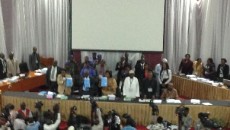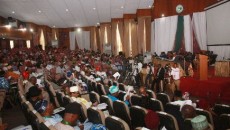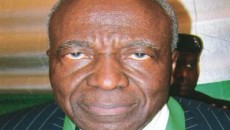Reports in the media of manoeuvrings by National Conference delegates over the weekend brought up a high degree of concern about what the situation would be as the Conference reconvened on Monday 7 July 2014.
For those who had not paid attention, the issues in contention were basically the recommendations for the de-listing of names of local governments from the Nigerian Constitution and the naming of proposed states to be created in the Votes of Proceedings. There are other matters that some delegates had issues with.
The problem was that the issues were all already decided by the time the concerns were raised publicly. The background to the contentions was disagreement on the method by which decisions were made. Those who were disenchanted insisted that voice votes adopted by the Conference were not accurate measure of consensus or agreement by 70 per cent of those present and voting as required by the Conference rules of procedure.
Well, the day opened as usual with the Conference officials filing in and the National prayer (second stanza of the National Anthem) being said. Thereafter the votes of proceedings (minutes of meeting, in plain language) were to be adopted. Note that this had been the way by which eighteen reports had already been decided before now. The report adopted on 3 July was that of the Committee on Political Restructuring and Forms of Government.
In the past corrections were made with regards to facts that were not accurately captured. Sometimes corrections were made when some delegates insisted that their names were either misspelt or their titles were not properly annotated. Today most of the comments made were in the form of debates trying to reopen the issues that made headlines across the weekend. That Conference was able to eventually adopted the record of the meeting of Thursday 3rd July was quite an achievement by itself, considering that anxieties had been raised several notches over areas of disagreements and agreements.
The heated contention over the Political Restructuring and Forms of Government Report was not unexpected. Indeed, the reports of the three committees at the top of the list of committees set up by the Conference appear to have been purposely kept to the last week of debates by Conference leaders because of their potentially explosive nature. The other two committees were the one on National Security and the one on the Devolution of Power. As things turned out, the debate on the National Security came and went without anyone catching a fever.
Some have argued that the committees should have been taken in the sequence they were listed at the beginning of the Conference. If that had been the case, the outcome would probably have been different. But that can now only be a subject of speculation. It does appear that it was a wise decision to keep these ‘hot’ committees to the end. Why do we say so? By the time Conference came to the ‘hot’ committees many of the issues that were expected to be explosive had been dealt with. Issues like what would constitute the federating units in a federal system and whether states should have their police. As the debates progressed it became clear that delegates were already aligned on much of what would constitute devolution of power. For example, it was accepted early on that States would be the federating units and not zones or local government councils. In fact, the Committee on Law, Judiciary, Human Rights and Legal Reform had already proposed that States High Courts should be the highest court of resort in terms of offences that are not federal in nature. That decision set out a clear level of autonomy for States in judicial matters, making it needless for cases to rise to the Supreme Court when they do not need to. In a sense this brings justice not just closer in terms of decisions but nearer to the people in terms of access.
The last report to be debated was presented by the co-chairs of the Committee on Devolution of Power on Monday after the Votes of Proceedings had been laboriously adopted. However, the debate did not start immediately after the presentation the report. A cushion was provided by speeches that apparently sought to calm nerves over the tensions raised by the events of last week. But the debate eventually came.
After all the expectations and anxieties what happened was more like experiencing a release of teargas rather than bombs. You expected to hear serious contention over where the power devolved? We can tell you that the bulk of the debates were on what one delegate whispered to me as ‘the devolution of money.’ One section of the report that received attention from delegates was the portion about the ration by which revenue should be shared between the tiers of government.
The report itself is largely populated with recommendations about what expenditure item should be on the Exclusive List (handled by the Federal government) or on the Concurrent List (handled by both Federal and State governments) of the 1999 Constitution of Nigeria. And then the most commented on issue was that of the Derivation Formula, sometimes labelled Resource Control.
Although Resource Control has not been defined, it is understood to refer to how much of the rents collected from oil and gas exploitation ends up being ‘controlled’ by the States from where the oil and gas are extracted. This notion that the derivation formula refers only to oil and gas revenues has beclouded debates on the issue of wealth generation and distribution in Nigeria. Everyone agrees that the nation is loaded with gifts of nature. Yet all eyes have been exclusively focussed on oil and gas.
The national dependence on oil rents were solidified by the Nigerian military in their years of autocratic rule and the centralisation of governance following the command pattern that the military is known for. Everything was more or less dropped in the central pot and allocations were made to those assigned to run the States. The military and the politicians that worked with them could not care less about other sources of revenue as they abandoned agriculture, manufacturing and even the service sector. They were content to run a voodoo economy where cash literally dropped into the bank from the sky. To be shared.
This voodoo pleasure set the stage for the severe degradation and militarisation of the Niger Delta were crude oil and gas is exploited. Dissent was not tolerated. Blood flowed. Oil flowed. Dollars rolled in.
Today the environment of the oil field communities have been atrociously polluted and it will require hefty investment and years of work to achieve reasonable remediation. Unfortunately the derivation formula and palliatives extended to the region whether by way of the NNDC or the Ministry of Niger Delta have all gone towards provision of infrastructure rather than remediation and restoration of the environment. Ribbons may be cut celebrating completion of flashy buildings are somewhat motorable roads, but the people remain in putrid environments.
At the time of this blogging one cannot say how the debate will end, but the pendulum has been swinging between keeping the current 13 per cent allocation to oil bearing states to 21.5 per cent and up to 50 per cent. Some suggestions have been made of a graduated increase of the allocation over a ‘sunset’ period of fifteen years after which a 100 per cent allocation or ownership would be achieved.
A recommendation that no one has argued against is one that asks for the establishment of a special fund for the development of mineral resources. The Devolution of Power committee recommended that 4.5 per cent of gross revenue accruing to the Federation should go into this fund. The debate so far has been that the fund should be raised to 7 per cent or more.
We conclude that this fund is capable of helping resolve the arguments over what fraction of revenues generated by or in States should be retained by them. If every State in Nigeria generated sufficiently high amount of revenue everyone would probably be clamouring for 50 per cent retention of such resources and “Resource Control” would not be a song for oil and gas. What will critically be necessary is that about a quarter of whatever revenue accrues to any state and to the federal government should be allocated to special Environment Restoration Funds for the sake of taking our environment from life support.



